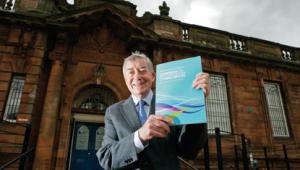Local authority leaders today welcomed the report of the Christie Commission into the future of public services in Scotland, saying it mapped out a ‘journey that local government is both willing and able to travel’.
Describing the report as significant and useful, the Convention of Scottish Local Authorities offered to commit immediately to the main themes, ahead even of a detailed ministerial response. Cosla promised early steps to refocus spending on early intervention, strengthen community planning and benchmark performance.
‘We are pleased to see the link between circumstance and demand for services at last being recognised,’ Cosla said. ‘We’re pleased that the report recommends more spend on prevention and… a real focus towards integration, decentralisation and localism. We welcome the fact that [Christie] is not proposing reform in the abstract.’
The commission, headed by former Scottish Trades Union Congress leader Campbell Christie, calls for a shift in service provision to a more preventative, collaborative and outcome-based approach, and demands firmer strategies to tackle inequality.
It estimates that up to 40% of Scottish public spending goes on remedying problems that early intervention could have prevented, and warns: ‘Unless Scotland embraces a radical, new, collaborative culture throughout our public services, both budgets and provision will buckle under the strain.’
The report has been criticised by some for offering few concrete measures to create that culture. It proposes no major structural changes – something Cosla welcomed – beyond breaking down functional divisions between providers, most notably between health and social work in the care of elderly people.
Grahame Smith, Christie’s successor at the STUC, said the commission’s report offered Finance Minister John Swinney little help with impending budget problems. ‘Unfortunately it was not in the commission’s remit to consider issues of tax and spend or the effect of economic policy on income inequality,’ he said.
‘Nevertheless the core messages on switching to early intervention and entrenching the expectation on equal outcomes are to be welcomed.’
Finance Minister John Swinney said the Scottish Government’s track record provided a ‘firm foundation’ for advancing the report’s aims. ‘The Scottish government is ambitious to maintain and improve our public services within tightly constrained resources.’
Swinney’s
Labour shadow, Richard Baker, challenged the Scottish Government to publish a
plan and timetable for making the changes sought by the report.
The report was also welcomed by public sector professionals. In a
statement issued with 11 other professional bodies (including CIPFA
Scotland), the Society of Local Authority Chief Executives in Scotland
welcomed the emphasis on outcomes, and said there was a
once-in-a-lifetime opportunity to address deep-rooted social issues.
Solace
chair Ronnie Hinds welcomed the emphasis on integration: ‘Local
government is ready for this challenge and, in many areas, we are
already working towards these goals with our partners.’
Martin
Sime, chief executive of the Scottish Council for Voluntary
Organisations, said: ‘The third sector is good at preventative
approaches and specialises in working with people, not doing things to
them. Now is the time for our sector to be more assertive in its demands
for a greater role and for doing things differently.’





















